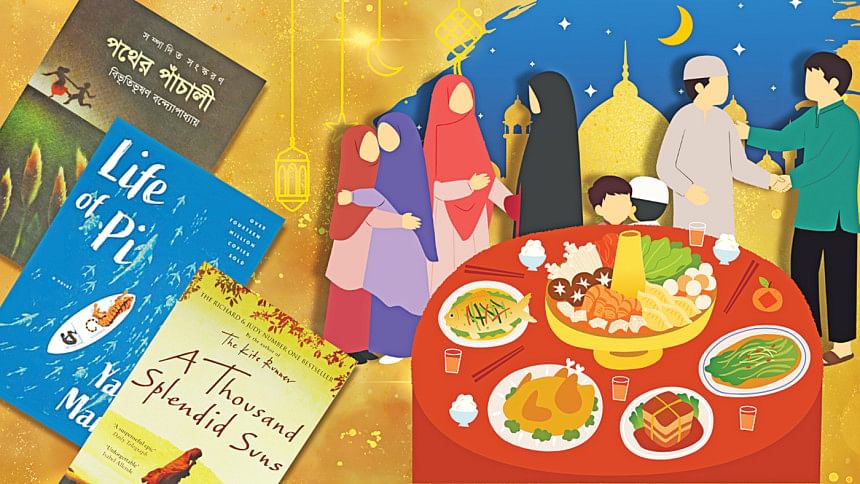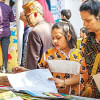6 literary characters we wish could join our Eid table

What if our Eid table had a few extra chairs reserved not for guests from our world but from that of the books we've loved throughout our life? From classic Bangla novels to global favourites—from wizards to wanderers—what if our favourite literary characters showed up for Eid lunch or dinner? Here's what the celebration might look like if fiction stepped into our reality, softening the room, stirring the silence, and reminding us that stories, like Eid, are best when shared.
Apu from Pather Panchali
Bibhutibhushan Bandyopadhyay
Ranjan Prakashalay, 1929
Apu would sit silently at first, absorbing every detail of the celebration with a gaze as wide as the world. He'd steal glances at the food, not from greed, but wonder, and you'd catch him smiling softly at a mother fussing over her children. As the meal continued, he'd listen more than speak, but when someone recited a poem, he'd quietly say, "This smells like monsoon mornings and my mother's hands." There would be something old and aching in his innocence—an Eid presence that reminded everyone of what they'd once yearned for.
Laila from A Thousand Splendid Suns
Khaled Husseini
Riverhead Books, 2007
She'd arrive with grace, her hands full of gifts she insists aren't much, perhaps some sweets wrapped in cloth, or a dish passed down from her mother. You'd catch her tearing up during the prayer, and when you asked why, she'd simply say: "It's just been a long time since joy felt this free." The way she held a child, passed a plate, or smiled at an elderly person would carry the quiet composure of someone who once had to be tough but now chooses tenderness. Eid, through her, would feel like a celebration not of ease, but of the strength it takes to keep choosing love.
Feluda from Feluda Series
Satyajit Ray
Feluda would arrive sharply dressed and perfectly on time, his eyes scanning the room with effortless calm, already noting which cousin hadn't spoken to whom and who was piling onto their plate like they had something to prove. He'd greet the elders with deep respect and the children with clever wordplay, but when the food was served, he'd settle in with genuine pleasure, taking precise bites of kabab and appreciating the texture of paratha. He'd leave without dessert, claiming he was watching his sugar but you'd find a kalo jaam missing from the tray!
Pi Patel form Life of Pi
Yann Martel
Knopf Canada, 2001
Pi would arrive with gentle curiosity in his eyes, asking about every tradition, to not question but to understand. He'd marvel at the crescent moon, comparing it to a boat cradling the first breath of celebration, and asking why desserts like shemai were served warm. Over lunch, he'd share a story so surreal about hunger, storms, animals, and prayer that it would feel like a myth, until he looked at you and said, "There are many versions of truth. I believe them all a little." In his company, Eid would feel both vast and intimate, like the sea.
Hermione Granger from the Harry Potter series
J.K. Rowling
Hermione would arrive five minutes early, wearing something simple but thoughtfully chosen, with a carefully wrapped Eid gift—probably a translated collection of classical Muslim poetry or a handmade bookmark with gold-ink calligraphy. She'd ask about every dish with genuine interest: how it's made, what it means, where the spices come from, and would make sure to compliment the chef in the most articulate way possible. Her presence would bring a sense of care and thoughtfulness to the table like everything was just a little more seen, and a little more loved.
Himu from the Himu series
Humayun Ahmed
Himu might arrive late and unbothered but smiling, in his faded yellow panjabi that somehow looks more like a statement than an accident. He'd greet everyone with a wide, crooked grin, say something utterly ridiculous to an uncle that would earn him a frown, and then follow it up with a line so oddly wise that no one would be able to tell if he was joking or gently exposing the truth. But the grandmothers would adore him, slipping him extra kebabs and chicken roast while chuckling under their breath. People like Himu make space—for joy, for softness, for the kind of lightness that makes a day feel warmer, happier, more alive.
Mahmuda Emdad is a women and gender studies major with an endless interest in feminist writings, historical fiction, and pretty much everything else, all while questioning the world in the process. Reach her at [email protected].

 For all latest news, follow The Daily Star's Google News channel.
For all latest news, follow The Daily Star's Google News channel. 






Comments